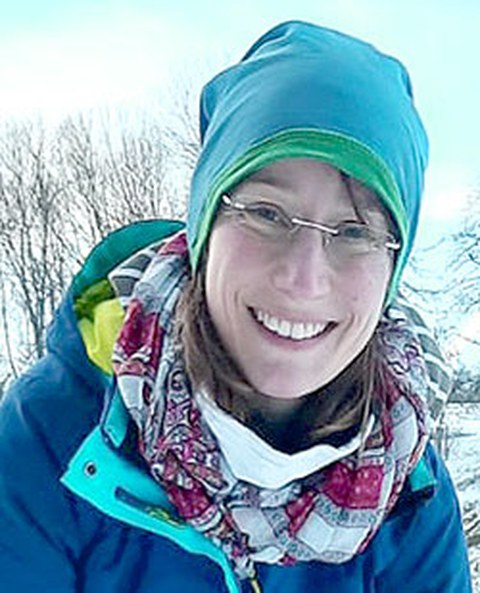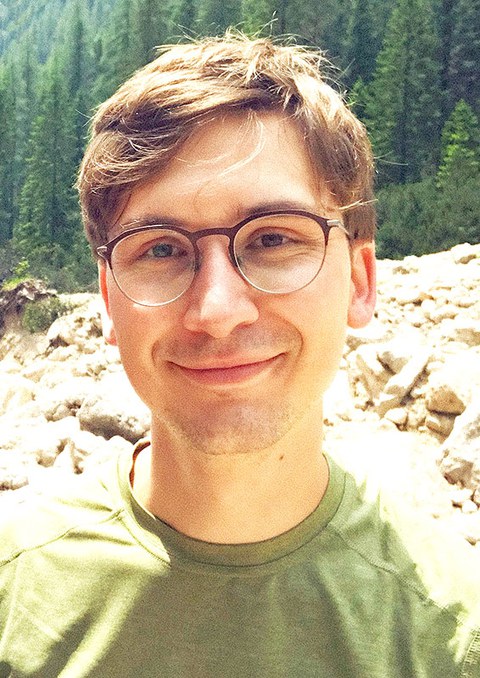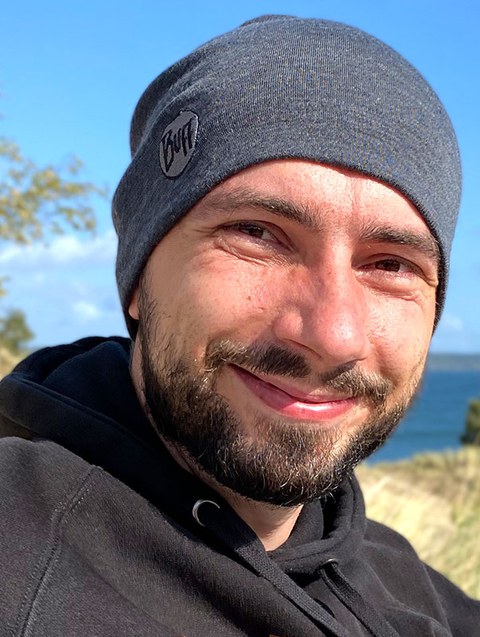MacGyver-style problem-solvers
(Interview from 2021)
Dagmar Möbius
The job market for physicists is not a vast one. Three alumni who earned their doctorates at the Institute of Nuclear and Particle Physics at TU Dresden now work for a global company that is a considered to be a pioneer of remote working technology. They told "Kontakt-online" – via video link, of course – about what they do at LogMeIn and why their degrees have (nonetheless) been useful.
Being able to work from anywhere was just a dream for many people before the COVID-19 pandemic. Dr. Franziska Iltzsche, Dr. Felix Socher, and Dr. Carsten Bittrich are some of the people ensuring that remote working runs smoothly. They have no regrets about their path from research to business.
When Felix Socher began his physics degree at TU Dresden in 2005, he had 240 peers. About 60 young people graduated with a Diplom degree. Franziska Iltzsche and Carsten Bittrich started their bachelor's degree program in 2009 with 130 others, and around 60 students earned a master's degree. "A lot of people switch subjects," says Carsten Bittrich.

Franziska Iltzsche
Just like now, women were in the minority; they account for about ten percent of alumni. "You have to spend a lot more time explaining yourself if you are a woman," says Franziska Iltzsche of her experience. She enjoyed her lessons thanks to a great teacher in school, and wanted to study physics "to understand how the world works the way it does" and go into research.
"Physics? But you're a woman." This is something she heard a lot. Franziska Iltzsche has a lot to say about prejudices, clichés, and mental images of who should be doing what. In her view, "there's still a lot of work to be done on acceptance."

Felix Socher
Felix Socher came to TU Dresden as a school student for the "Saturday Physics" program, and later did an internship. Faced with a choice between medicine, computer science, and physics, he opted for physics, "because it explores the widest range of problems of the three subjects. What’s more, unlike in medicine, you usually have enough time to think about your answers." Carsten Bittrich was born in Görlitz and his interest in science initially took him to Bergakademie Freiberg. When Freiberg stopped offering his intended specialization one year later, he switched to TU Dresden.
All three alumni completed their undergraduate degrees with single-minded focus, and went on to complete doctorates on aspects of the ATLAS detector at the Large Hadron Collider (LHC) particle accelerator, located at the European Organization for Nuclear Research CERN. Around 3000 scientists around the world are conducting research as part of the ATLAS experiment. Franziska Iltzsche moved straight from TU Dresden to LogMeIn in July 2018 and wrote her doctorate while working. The mother of three and her team evaluate audio quality data and identify problems, which are then sent to other groups for fixing.
After completing his doctorate, Felix Socher worked as a software developer at a Dresden-based start-up before joining LogMeIn in May 2019. He is part of the endpoint component team, responsible for integrating audio technologies into the app. "We are the glue that holds the specialized teams together," he explains, laughing, "in other words the MacGyver-style problem-solvers. Customers send their log files, and we look for and fix the errors." Carsten Bittrich followed his advisor for his bachelor's and master's theses and doctoral dissertation to LogMeIn in November 2020. "We've always kept in touch, there was a vacancy, and now we're working in a team of ten."
At LogMeIn, they appreciate the open atmosphere and how staff work together and treat each other. "This is to the credit of the managers, who put together and support effective teams," agree Franziska Iltzsche and Felix Socher. A coffee bar and a refrigerator full of fruit and snacks ensure employees get the energy they need.

Carsten Bittrich
Carsten Bittrich, however, has not been to the office once since he joined the company – he was hired online during the coronavirus pandemic. "That's why I'm not one of those people who gain weight after starting work because the sweets are too tempting," he laughs. He found the company offered just the flexible and international environment he was familiar with from university. "It's a great overall package: an American company with all the benefits of German regulation," he says.
Looking back on his studies, he would have liked to learn more about programming, as it's (more) difficult to get into the field without the background. However, he is aware that efforts to fill that gap are underway at the Institute of Nuclear and Particle Physics at TU Dresden. At the Institute, he gained more than just a lot of day-to-day experience in technical matters; he also acquired skills such as time management, organizing meetings and seminars, and leading groups. Franziska Iltzsche praises the wide-ranging program at TUD. Apart from her programming skills, she currently has little practical application for specialist knowledge from her studies. But she says that studying also shapes your personality, self-confidence, and how professionally you approach problems. Felix Socher sums it up like this: "Software development is a mix of programming, design, and domain knowledge – in our case knowledge of real-time communication, and also statistics. You need to learn programming skills and statistics as well as high-energy physics to solve particle physics problems." The organizational skills he picked up during his doctorate are now particularly useful.
None of the three physics alumni regrets their move into business. "Particle physics is highly specialized, and there are very few jobs," says Felix Socher. He did not want to spend his life on the road; he wanted a good balance between career and family. Today, he finds "programming more exciting."
Franziska Iltzsche was not fully aware beforehand of all the implications of research, with its workload of 60 to 70 hours a week. She felt torn between work and family and knew that it was not sustainable in the long term.
Carsten Bittrich's priorities changed when his first child was born as he was studying for his doctorate. "It is not very realistic to hope for a permanent job opportunity in one place. Even extremely competent people don't find permanent employment. I don't want to move the family around every two years." It's all right with Dr. Franziska Iltzsche, Dr. Felix Socher, and Dr. Carsten Bittrich that research has had to take a back seat.
They still have ties to TUD. LogMeIn partners with several computer science chairs, offers student jobs and internships, and supervises final theses. Many TUD alumni also work at the company, which has more than 3500 employees worldwide.
Contact:
Dr. Franziska Iltzsche: Email
Dr. Felix Socher: Email
Dr. Carsten Bittrich: Email

